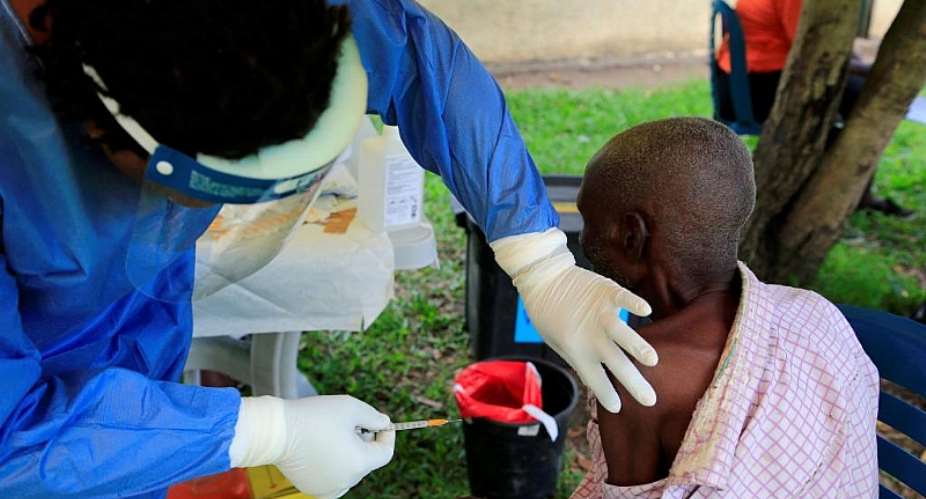An Ebola scare in Kenya turned out to be a false alarm on Monday. But the nation remains on high alert after two Ugandans who had travelled to the DRC died of Ebola last week. Officials in Tanzania have warned that the virus could cross into Dar es Salam.
"A single case of Ebola is an outbreak and containing it is very important," says Yonas Tegegn Woldemariam, the World Health Organisation Representative in Uganda.
On Friday, the global health body said the outbreak did not yet warrant being declared a global emergency, yet insisted that the situation was nonetheless serious.
"We have been preparing for this for the past 10 months. It doesn't diminish the seriousness whether it is in one country or two," Woldemariam told RFI.
The Ebola virus crossed from the Democratic Republic of Congo into Uganda last week, killing at least two people.
Uganda has had five previous Ebola outbreaks, all of which were indigenous.
This sixth outbreak is the first case involving cross-border infection. It was provoked after a Congolese woman and her family travelled to DRC to care for the woman's dying father and then returned to Uganda.
The woman's five-year-old son and 50-year-old mother died. The boy's brother, aged three, is also infected, and several family members are in isolation.
Porous borders
Mass gatherings, including market days and prayers, have since been cancelled. Kampala has kept its border with the DRC open.
"Uganda is a very open society, it allows its neighbours to travel here, and having relatives on the other side of the border is common," says Woldemariam.
Screening has been stepped up at border points, where people coming in are urged to wash their hands with chlorinated water or have their temperature taken.
However, the Red Cross has warned that people are continuing to enter the country through back routes instead of passing through official checkpoints.
"We have invested in what we call a community-based surveillance system where village health teams are briefed and their capacity built to identify signs and symptoms of Ebola," explains Woldemariam.
"In the last 10 months, Uganda has tested six times the number of people for Ebola than they would in any given year," he adds.
Efforts to contain the spread have been more challenging in neighbouring DRC, because of militia group violence and suspicion of foreign medical assistance.
'Don't panic'
"In Uganda, we use local health professionals, so we are not just coming from outside trying to solve the problems; it is the local system which is addressing this issue so the local ownership is there," Woldemariam said.
The World Health Organization was heavily criticised in the past for its slow response during the 2014 ebola epidemic in West Africa that claimed 11,300 lives.
Woldemariam reckons the disease can be contained if managed properly.
"People should be concerned but not panic. If they know the signs and symptoms, [cough, fever, vomiting] if they wash hands, if they keep their distance from a sick person; or if, by any chance, they touch that person they should go immediately and wash their hands."
Woldemariam says the basic message is very simple: although it's a scary disease, Ebola is controllable and can be defeated.





 Lay KPMG audit report on SML-GRA contract before Parliament – Isaac Adongo tells...
Lay KPMG audit report on SML-GRA contract before Parliament – Isaac Adongo tells...
 Supervisor remanded for stabbing businessman with broken bottle and screwdriver
Supervisor remanded for stabbing businessman with broken bottle and screwdriver
 NDC watching EC and NPP closely on Returning Officer recruitment — Omane Boamah
NDC watching EC and NPP closely on Returning Officer recruitment — Omane Boamah
 Your decision to contest for president again is pathetic – Annoh-Dompreh blasts ...
Your decision to contest for president again is pathetic – Annoh-Dompreh blasts ...
 Election 2024: Security agencies ready to keep peace and secure the country — IG...
Election 2024: Security agencies ready to keep peace and secure the country — IG...
 People no longer place value in public basic schools; new uniforms, painting wil...
People no longer place value in public basic schools; new uniforms, painting wil...
 'Comedian' Paul Adom Otchere needs help – Sulemana Braimah
'Comedian' Paul Adom Otchere needs help – Sulemana Braimah
 Ejisu by-election: Only 33% of voters can be swayed by inducement — Global InfoA...
Ejisu by-election: Only 33% of voters can be swayed by inducement — Global InfoA...
 Minority will expose the beneficial owners of SML, recover funds paid to company...
Minority will expose the beneficial owners of SML, recover funds paid to company...
 Prof. Opoku-Agyemang has ‘decapitated’ the NPP’s strategies; don’t take them ser...
Prof. Opoku-Agyemang has ‘decapitated’ the NPP’s strategies; don’t take them ser...
